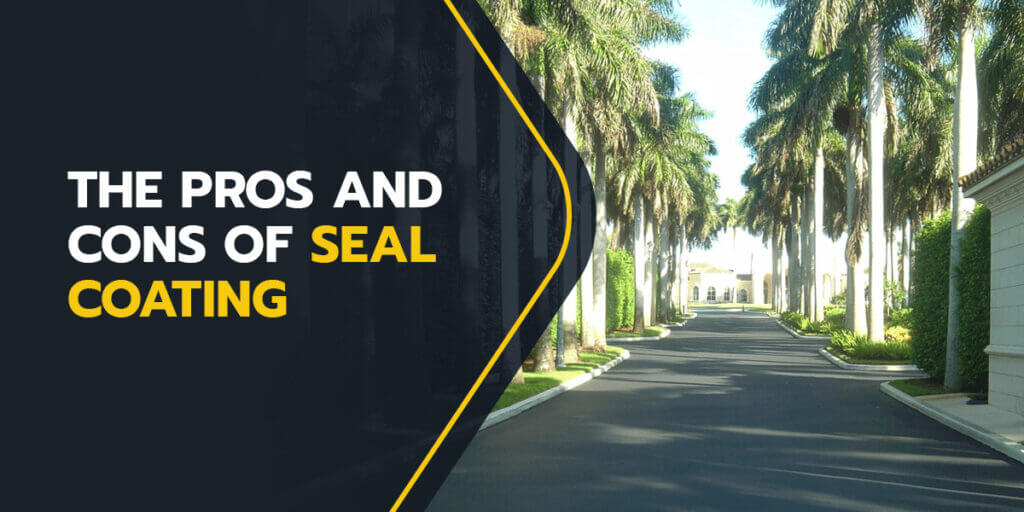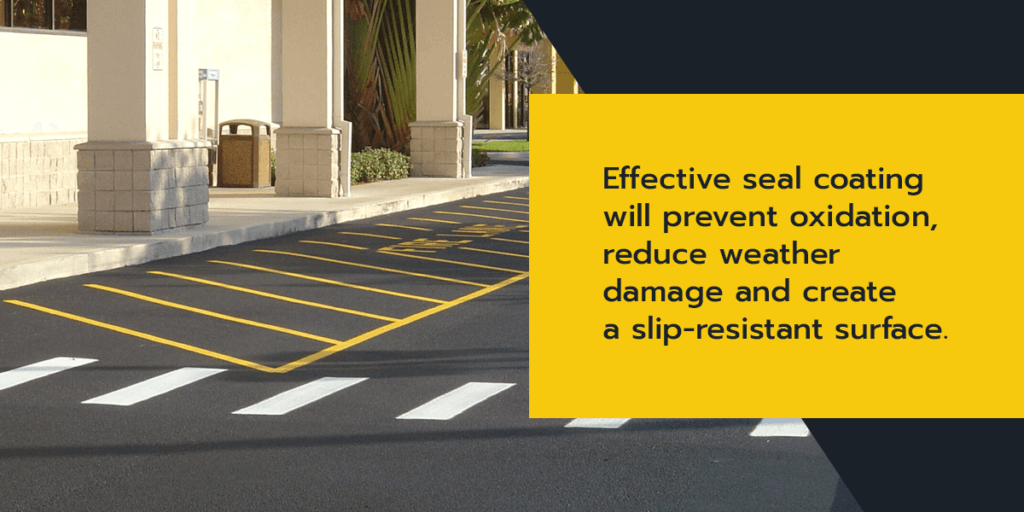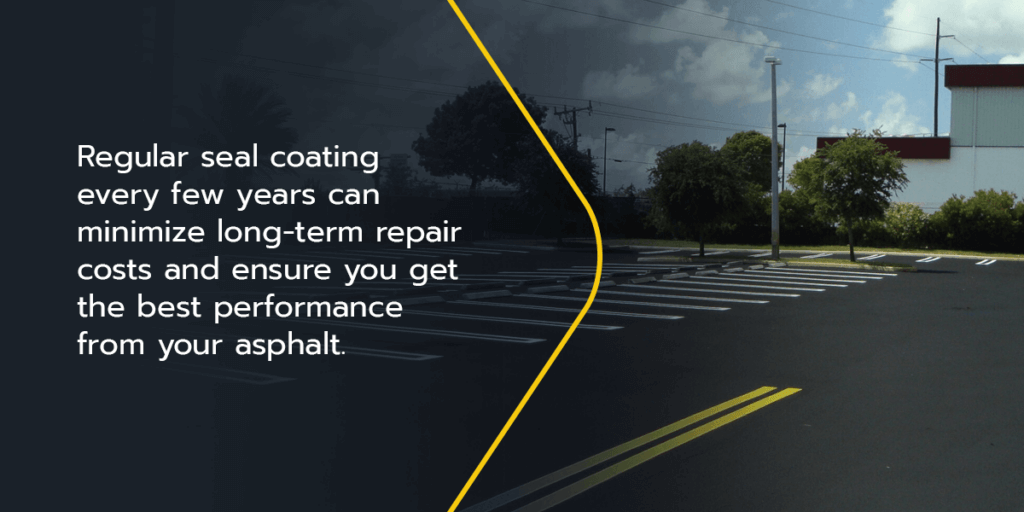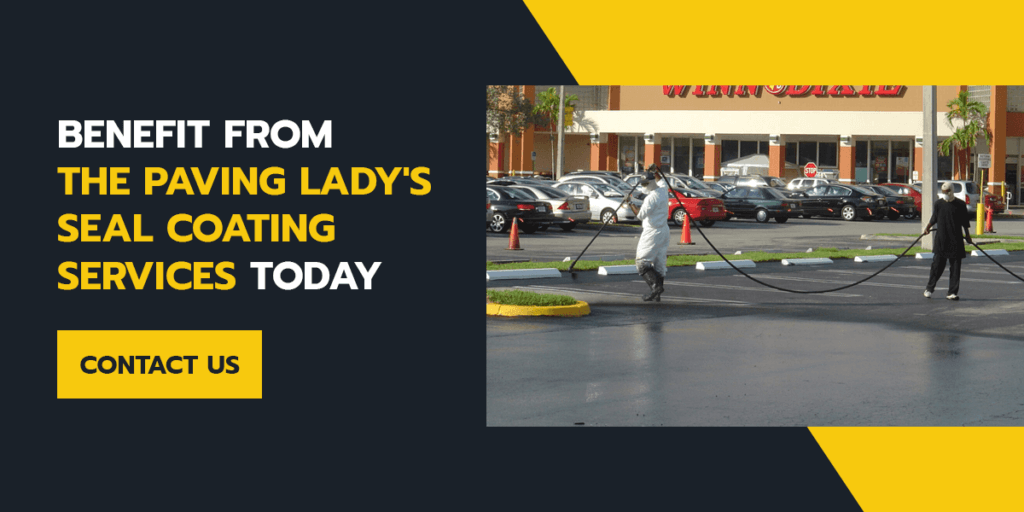
The Pros and Cons of Seal Coating
Despite being the material of choice for most pavement projects, asphalt deteriorates quickly when not properly maintained. Untreated pavement will dry out, fade, crack and crumble over time. Asphalt seal coating protects and extends the life of roadways, parking lots and driveways.
To help you decide if seal coating is the right service for you, we’re here to weigh the potential challenges and valuable benefits of seal coating your asphalt.

What Is Asphalt Seal Coating?
Asphalt pavement is primarily a blend of sand and gravel aggregate held together with a binder. The petroleum-based binder makes the mixture flexible and pliant, though it’s often where the degradation process begins. UV rays, water, oil, road salt and other chemicals can quickly degrade the binder — causing the asphalt to dry out, fade, crack and crumble.
Pavement seal coating reduces these effects, prolonging your asphalt’s life. Seal coats are made from specifically formulated oils and paving material, typically applied in a liquid composition by brush, spray or squeegee. When used at the optimal time, the seal coat forms a protective barrier against the elements. Effective seal coating will prevent oxidation, reduce weather damage and create a slip-resistant surface.
Advantages of Seal Coating
Once the seal coat is applied, it soaks into the asphalt and provides crucial benefits to the driveway or parking lot. Pavement seal coating pros include:
- Restoring the deep, shiny, black appearance of freshly laid pavement.
- Forming a protective barrier against UV rays, water, oil and other oxidizing substances.
- Replenishing the degraded petroleum binder and specifically formulated oils.
- Keeping the asphalt from becoming brittle, drying out, cracking and crumbling.
The seal coat gives faded asphalt a fresh, new look. Over time, the sun and other weather conditions make your pavement appear washed out and grey. Parking lot or driveway seal coating can restore sun-bleached asphalt to like-new condition. It can also smooth out your driveway’s appearance by filling small gaps in the aggregate. Improve your property’s aesthetics and increase its value with a shiny, smooth, fresh-looking driveway or lot.
Seal coating strengthens your asphalt by replenishing any dry or crumbling areas in the petroleum binder. Water and UV rays dry out the asphalt over time, while motor oil and gasoline leaks cause the binder to deteriorate rapidly. The seal coat forms a protective barrier against these harmful elements and oxidizing substances. This way, the binder remains flexible and pliant for a longer period.
When oil or water compromises the pavement’s structural integrity, potholes are more likely to form. Untreated cracks in the brittle pavement can quickly turn into unsightly and dangerous potholes. Use a seal coat to prevent oxidation and block out elements that eventually create potholes in unsealed asphalt.
Disadvantages of Seal Coating
It’s wise to consider a few common cons of seal coating before making this investment. Most seal coating cons relate to the time needed before applying the first seal coat on freshly paved asphalt. For the best results, your asphalt must be in decent condition before sealing. It won’t repair or restore cracked or crumbling pavement.
Seal coating can be applied to surfaces with minimal cracking, dry patches or faded sections. However, any pavement cracks, potholes or areas with compromised structural integrity must be repaired first. Freshly laid asphalt generally requires three to six months before you can apply the seal coat. This timeframe can be an inconvenience for some property owners.
The seal coat will also require 24 hours to cure, and vehicle traffic can’t touch the asphalt during this time. Other considerations include your local climate. Seal coating relies on having the correct temperature and weather conditions. Asphalt can’t correctly cure in the rain, and temperatures must remain at a minimum of 50 degrees during this same 24 hour period.
Finally, sealing is an ongoing process. For continued results, the pavement must be resealed every two to three years — a minor disadvantage when considering the types of damage that unsealed driveways and parking lots can experience.
Should I Seal Coat or Repave My Pavement?
Before you consider applying a seal coat, make sure to complete any asphalt repairs. Fill cracks and patch up potholes. For severely damaged or degraded asphalt, consider putting down an asphalt overlay to restore its appearance. Once your repaved asphalt has cured, add a seal coat to keep the pavement protected and attractive for longer.

Is Seal Coating Necessary?
While pavement seal coating won’t repair existing issues, like cracks and potholes, it can prevent future damages. Property owners and managers who wait too long to seal their asphalt often need to restore it with asphalt resurfacing and other costly repair methods. You could pay thousands of dollars for fresh, new asphalt.
Regular seal coating every few years can minimize long-term repair costs and ensure you get the best performance from your asphalt. The seal coat extends your pavement’s life and prevents major pavement issues from forming in the first place. Its lower cost can save you money in the long run.
Here are a few more essential benefits of seal coating your asphalt:
- Longer life expectancy: Asphalt seal coating more than doubles the life of your pavement. Its protective barrier prevents sun damage and liquid penetration that can eventually cause fading, cracking and crumbling.
- Increased flexibility: The seal coat creates a flexible and pliant top layer that can withstand the excessive weight. Untreated asphalt will crack easily under the weight of heavy vehicles and high foot traffic.
- Enhanced surface: Restore your pavement to the jet-black finish of freshly laid asphalt. Seal coating provides like-new conditions and slip-resistant properties for a more attractive and safer surface.
- Less maintenance: Smooth, even pavement is quicker to clean and maintain. A regularly scheduled sealing program ensures that the road or lot requires minimal upkeep.
Keep your asphalt surface functional and attractive with a more cost-effective solution.
Benefit From The Paving Lady’s Seal Coating Services Today
Trust The Paving Lady to amplify the benefits of seal coating while alleviating your concerns for the cons. We can offer a comprehensive consultation for your asphalt to determine whether seal coating is the right option for your lot. Professional seal coating services enhance the performance of your asphalt for the longest amount of time.
If you need asphalt seal coating in South Florida, we will protect your investment by prolonging the life of your pavement. We also offer a range of asphalt services, in addition to seal coating. Learn how we can help with your next pavement project today. Request your free quote or contact us online for more information.

